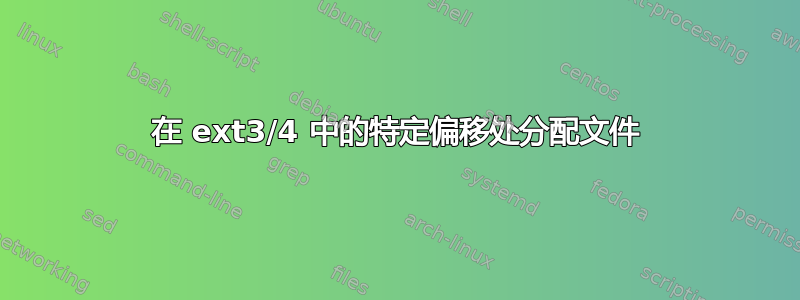
出于基准测试和测试目的,我需要能够在距分区开头的特定偏移量处分配文件。当我正常创建一个新文件时,它的块放置在文件系统决定的任何位置,但我想控制它。换句话说,我想手动选择将哪些块分配给文件。
我查看了 debugfs,但找不到任何方法来执行我想要的操作。虽然我可以将块标记为已分配并修改 inode,但这仅适用于前 12 个块。之后,我还需要能够创建间接和双间接块,这看起来 debugfs 没有任何能力。
有什么办法可以做到这一点吗?有什么工具可以帮助我吗?您可以假设文件系统是 ext3 或 ext4,并且它已被重新格式化(不存在其他文件)。
提前致谢。
答案1
我已经设法找到一种方法来做到这一点。它使用一个 python 脚本,该脚本首先用于debugfs查找文件所需的所需块数(包括间接块)。然后,它手动将间接块写入磁盘,并debugfs再次调用以将块标记为已使用并更新文件的索引节点。
唯一的问题是,debugfs当您使用 时,显然不会更新块组的空闲块计数setb。尽管我可以手动设置该参数,但似乎没有任何方法可以打印当前值,因此我无法计算正确的值。据我所知,它不会产生任何真正的负面后果,并且fsck.ext3可以在需要时用于纠正值,因此出于基准目的,它可以做到。
如果我错过了任何其他文件系统一致性问题,请告诉我,但由于fsck.ext3除了不正确的空闲块计数之外没有报告任何内容,我应该是安全的。
import sys
import tempfile
import struct
import subprocess
SECTOR_SIZE = 512
BLOCK_SIZE = 4096
DIRECT_BLOCKS = 12
BLOCKS_PER_INDIRECT_BLOCK = BLOCK_SIZE / 4
def write_indirect_block(device, indirect_block, blocks):
print "writing indirect block ", indirect_block
dev = open(device, "wb")
dev.seek(indirect_block * BLOCK_SIZE)
# Write blocks
for block in blocks:
bin_block = struct.pack("<I", int(block))
dev.write(bin_block)
zero = struct.pack("<I", 0)
# Zero out the rest of the block
for x in range(len(blocks), BLOCKS_PER_INDIRECT_BLOCK):
dev.write(zero)
dev.close()
def main(argv):
if len(argv) < 5:
print "Usage: ext3allocfile.py [device] [file] [sizeInMB] [offsetInMB]"
return
device = argv[1] # device containing the ext3 file system, e.g. "/dev/sdb1"
file = argv[2] # file name relative to the root of the device, e.g. "/myfile"
size = int(argv[3]) * 1024 * 1024 # Size in MB
offset = int(argv[4]) * 1024 * 1024 # Offset from the start of the device in MB
if size > 0xFFFFFFFF:
# Supporting this requires two things: triple indirect block support, and proper handling of size_high when changing the inode
print "Unable to allocate files over 4GB."
return
# Because size is specified in MB, it should always be exactly divisable by BLOCK_SIZE.
size_blocks = size / BLOCK_SIZE
# We need 1 indirect block for each 1024 blocks over 12 blocks.
ind_blocks = (size_blocks - DIRECT_BLOCKS) / BLOCKS_PER_INDIRECT_BLOCK
if (size_blocks - DIRECT_BLOCKS) % BLOCKS_PER_INDIRECT_BLOCK != 0:
ind_blocks += 1
# We need a double indirect block if we have more than one indirect block
has_dind_block = ind_blocks > 1
total_blocks = size_blocks + ind_blocks
if has_dind_block:
total_blocks += 1
# Find free blocks we can use at the offset
offset_block = offset / BLOCK_SIZE
print "Finding ", total_blocks, " free blocks from block ", offset_block
process = subprocess.Popen(["debugfs", device, "-R", "ffb %d %d" % (total_blocks, offset_block)], stdout=subprocess.PIPE)
output = process.stdout
# The first three entries after splitting are "Free", "blocks", "found:", so we skip those.
blocks = output.readline().split(" ")[3:]
output.close()
# The last entry may contain a line-break. Removing it this way to be safe.
blocks = filter(lambda x: len(x.strip(" \n")) > 0, blocks)
if len(blocks) != total_blocks:
print "Not enough free blocks found for the file."
return
# The direct blocks in the inode are blocks 0-11
# Write the first indirect block, listing the blocks for file blocks 12-1035 (inclusive)
if ind_blocks > 0:
write_indirect_block(device, int(blocks[DIRECT_BLOCKS]), blocks[DIRECT_BLOCKS + 1 : DIRECT_BLOCKS + 1 + BLOCKS_PER_INDIRECT_BLOCK])
if has_dind_block:
dind_block_index = DIRECT_BLOCKS + 1 + BLOCKS_PER_INDIRECT_BLOCK
dind_block = blocks[dind_block_index]
ind_block_indices = [dind_block_index+1+(i*(BLOCKS_PER_INDIRECT_BLOCK+1)) for i in range(ind_blocks-1)]
# Write the double indirect block, listing the blocks for the remaining indirect block
write_indirect_block(device, int(dind_block), [blocks[i] for i in ind_block_indices])
# Write the remaining indirect blocks, listing the relevant file blocks
for i in ind_block_indices:
write_indirect_block(device, int(blocks[i]), blocks[i+1:i+1+BLOCKS_PER_INDIRECT_BLOCK])
# Time to generate a script for debugfs
script = tempfile.NamedTemporaryFile(mode = "w", delete = False)
# Mark all the blocks as in-use
for block in blocks:
script.write("setb %s\n" % (block,))
# Change direct blocks in the inode
for i in range(DIRECT_BLOCKS):
script.write("sif %s block[%d] %s\n" % (file, i, blocks[i]))
# Change indirect block in the inode
if size_blocks > DIRECT_BLOCKS:
script.write("sif %s block[IND] %s\n" % (file, blocks[DIRECT_BLOCKS]))
# Change double indirect block in the inode
if has_dind_block:
script.write("sif %s block[DIND] %s\n" % (file, dind_block))
# Set total number of blocks in the inode (this value seems to actually be sectors
script.write("sif %s blocks %d\n" % (file, total_blocks * (BLOCK_SIZE / SECTOR_SIZE)))
# Set file size in the inode
# TODO: Need support of size_high for large files
script.write("sif %s size %d\n" % (file, size))
script.close()
# execute the script
print "Modifying file"
subprocess.call(["debugfs", "-w", device, "-f", script.name])
script.unlink(script.name)
if __name__ == "__main__":
main(sys.argv)
该脚本可以按如下方式在偏移量 200GB 处创建一个 1GB 文件(您需要是 root):
touch /mount/point/myfile
sync
python ext3allocfile.py /dev/sdb1 /myfile 1024 204800
umount /dev/sdb1
mount /dev/sdb1
为了让系统识别更改,必须使用 umount/mount 组合。您可以在调用脚本之前卸载,但这会使调用速度debugfs变慢。
如果有人想使用这个:我不保证它会正常工作,如果您丢失任何数据,我不承担任何责任。一般来说,不要在包含任何重要内容的文件系统上使用它。
答案2
这不是你想要的答案,我意识到了。但该方法与文件系统无关。
仅一次
找到块大小;从头到尾循环创建该块大小的文件;一旦完成;删除除您想要的文件之外的所有文件。
完成后,将设备的原始副本复制到压缩文件中
dd if=/dev/sdp1 |bzip2 -9 > /tmp/my-fs-image.bz2
瞧!文件系统映像并不是很大,只有一个块位于您想要的位置。分配。
要恢复,请创建一个具有完全相同数量/大小的物理磁盘块的分区
bzip2 -d < /tmp/my-fs-image.bz2|dd of=/dev/sdq1
第一次复飞,会很麻烦。


